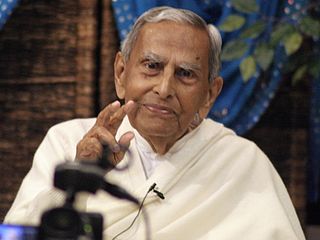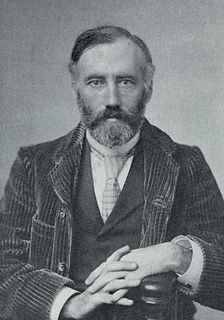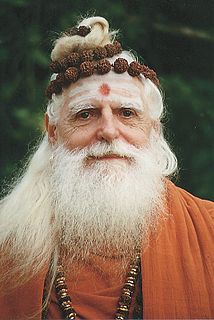A Quote by Dada Vaswani
The law of karma is neither fatalistic nor punitive; nor is man a hapless, helpless victim in its bonds. God has blessed each one of us with reason, intellect and discrimination, as well as the sovereign free will. Even when our past karma inclines us toward evil, we can consciously tune our inclination towards detachment and ego-free action, thus lightening the karmic load.
Related Quotes
God does not deal our karma to us as a punishment. Karma is a manifestation of an impersonal law as well as a personal one. The purpose of our bearing our karma is that karma is our teacher. We must learn the lessons of how and why we misused the energy of life. Until that day comes when we recognize the Law of God as a Law of Love, we will probably encounter difficulties. But if we will only hasten that day's coming into our own life, we will recognize that karma is actually grace and beauty and joy. [and love and awareness and hope! -EM]
There is good Karma, there is bad Karma, and as the wheel of life moves on, old Karma is exhausted and again fresh Karma is accumulated... Karma is twofold, hidden and manifest, Karma is the man that is, Karma is his action. True that each action is a cause from which evolves the countless ramifications of effect in time and space... To the worldy man Karma is a stern Nemesis, to the spiritual man Karma unfolds itself in harmony with his highest aspirations.
What brings the karmic result from the patterns of our actions is not our action alone. As we intend and then act, we create [our] karma: so another key to understanding the creation of karma is becoming aware of intention. The heart is our garden, and along with each action there is an intention that is planted like a seed. The result of the patterns of our karma is the fruit of these seeds.
Karma is not fate, for man acts with free will, creating his own destiny. The Vedas tell us, if we sow goodness, we will reap goodness; if we sow evil, we will reap evil. Karma refers to the totality of our actions and their concomitant reactions in this and previous lives, all of which determines our future.
When we cross the gates of death, our karma is all we take with us. Everything else that we enjoyed in this life we leave behind... Our karma is the only thing that will count in determining our rebirth, for our next life is nothing but the effects of our karmic tendencies that materialize in our perception.
Dogs invite us not only to share their joy but also to live in the moment, where we are neither proceeding from nor moving toward, where the enchantment of the past and future cannot distract us, where a freedom from practical desire and a cessation of our usual ceaseless action allows us to recognize the truth of our existence, the reality of our world and purpose--if we dare.
Man depends on God for all things: God depends on man for one. Without man's love God does not exist as God, only as creator, and love is the one thing no one, not even God himself, can command. It is a free gift or it is nothing. And it is most itself, most free, when it is offered in spite of suffering, of injustice, and of death . . . The justification of the injustice of the universe is not our blind acceptance of God's inexplicable will, nor our trust in God's love, his dark and incomprehensible love, for us, but our human love, notwithstanding anything, for him.
Debts that must be paid ... that sums up the concept of karma. But I would add that karma is not a burden that you have to carry. It is also an opportunity to learn, a chance to practice love and forgiveness, a chance to learn lessons that are valuable to us. Karma offers us the chance to wipe our dirty slate clean, to erase the wrong doings of the past.
The only sovereign I can allow to rule me is reason. The first law of reason is this: what exists exists; what is is. From this irreducible, bedrock principle, all knowledge is built. This is the foundation from which life is embraced. Reason is a choice. Wishes and whims are not facts, nor are they a means to discovering them. Reason is our only way of grasping reality–it is our basic tool of survival. We are free to evade the effort of thinking, to reject reason, but we are not free to avoid the penalty of the abyss we refuse to see." -Richard
Neither numbers nor powers nor wealth nor learning nor eloquence nor anything else will prevail, but purity, living the life, in one word, anubhuti, realisation. Let there be a dozen such lion-souls in each country, lions who have broken their own bonds, who have touched the Infinite, whose whole soul is gone to Brahman, who care neither for wealth nor power nor fame, and these will be enough to shake the world.
We come before God to pray for the missing and the dead, and for those who loved them... Our purpose as a nation is firm, yet our wounds as a people are recent and unhealed and lead us to pray... This world he created is of moral design. Grief and tragedy and hatred are only for a time. Goodness, remembrance, and love have no end, and the Lord of life holds all who die and all who mourn... Neither death nor life nor angels nor principalities, nor powers nor things present nor things to come nor height nor depth can separate us from God's love.
We must, with God's help, eradicate the deadly poison of the demon of anger from the depths of our souls. So long as he dwells in our hearts and blinds the eyes of the heart with his somber disorders, we can neither discriminate what is for our good, nor achieve spiritual knowledge, nor fulfill our good intentions, nor participate in true life; and our intellect will remain impervious to the contemplation of the true, divine light; for it is written, 'Man's anger does not bring about the righteousness of God' (Jms. 1:20).


































